Post Apocalyptic Reads for an 8 Year Old
The end of the world is never actually the end of the world—at least non in fiction. After all, someone must survive to tell the tale. And what tales they are. Humans have been pondering the stop of being for every bit long as we've been aware of it (probably, I mean, I wasn't there), and as a consequence nosotros have a rich collection of apocalypse and post-apocalypse literature to read during our planet's senescence.
I've washed my best to limit this list to books in which at that place is—or has been—some kind of literal apocalypse, excluding dystopias (similarThe Handmaid's Tale) or simply bleak visions of the future. We could debate all day about what actually constitutes an "apocalypse"—2020 is checking a lot of boxes, equally you may have noticed—so for the most part, I've gone with my gut.
Of course, there are plenty more smashing apocalypse and post-apocalypse novels that didn't fit on this listing, and I haven't read plenty books in translation in this genre, and so as ever, please add on your own favorites in the comments.
(And stay safe out at that place.)
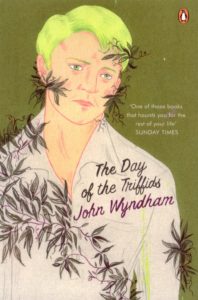
John Wyndham, The Solar day of the Triffids (1951)
It feels mildly ridiculous now—or maybe but balmy—but Wyndham'south killer-plant-cum-blindness-inducing-shooting star-strike apocalypse is a archetype for a reason: it's terrific fun. Even Arthur C. Clarke called it an "immortal story." And it'southward not quite likewise-known, merely allow me to slide in his 1955 novel The Chrysalids here as well, equally a b-side.
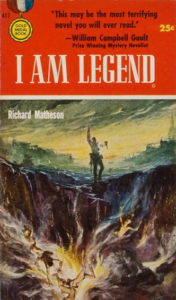
Richard Matheson, I Am Fable (1954)
At this point, Matheson'south pandemic/vampire/zombie novel is more famous for being source material than for being actual fabric, probably because it is inundation with ideas. It is sometimes awesome and sometimes boring; jury'due south all the same out on whether it really works as a novel, merely it admittedly gets points for influence. And verve.
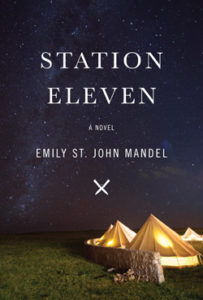
Emily St. John Mandel, Station 11 (2014)
Your favorite novel in which a influenza pandemic wipes out civilisation in a affair of weeks (yikes) and a band of entertainers wander the decimated land, putting on Shakespeare plays for the survivors. It'south about as experience-adept as stories about the apocalypse get.
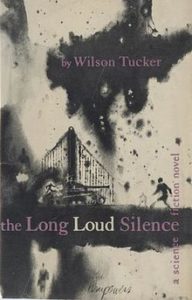
Wilson Tucker, The Long Loud Silence (1952)
Everything east of the Mississippi has been destroyed by a nuclear assail; the scant survivors have been dosed with a bioweapon that has infected them with the plague (but to be safe, I suppose). A war machine edge is prepare up forth the river to keep the sickness from spreading west, but this is a edge that Gary is determined to cross. Particularly strange and sad reading for a nation in quarantine—and proof that breaking it can bring disastrous effects.
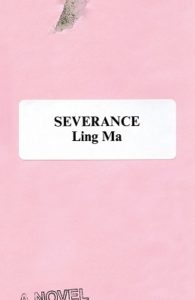
Ling Ma, Severance (2018)
The plague that ends the world in Ma's excellent debut is extra scary because we're all halfway at that place: when yous catch Shen Fever, yous continue going about your routine, doing your rote tasks, not that much more of a zombie than you were in life, until somewhen you lot rot abroad. Is Shen Fever really just weaponized nostalgia? Or condolement? Any it is, Candace is one of the few who finds herself immune, and documenting New York Metropolis as information technology crumbles around her until even she is forced to flee.
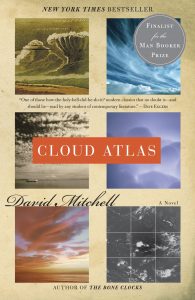
David Mitchell, Cloud Atlas (2004)
Of course Cloud Atlas is non entirely a novel well-nigh the finish of the world, and in fact of its six storylines just i could be considered post-apocalyptic (one other is squarely dystopian). But because the novel'south insistence on the interconnectedness of time and space (and people) and the centrality of the post-apocalypse it does evoke (located at the pinnacle of the novel's unique structure), I think it's just fair to count information technology hither.
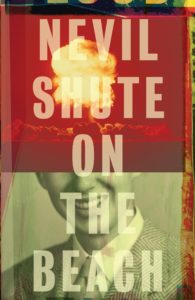
Nevil Shute, On the Embankment (1957)
It is 1963, and a nuclear state of war has devastated well-nigh of the planet. In Melbourne, relatively untouched, a handful of survivors expect for the winds to bring the radiation to their shore, occupying themselves more than or less usefully, if such a matter tin can exist said to have whatsoever meaning at the end of the world, as others investigate what may be a message from a survivor in Seattle. A moving, if non particularly scientifically sound, classic.
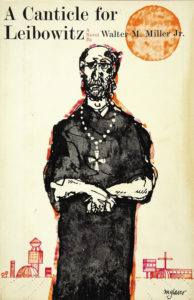
Walter M. Miller, Jr., A Canticle for Leibowitz (1960)
Afterwards civilisation has been generally wiped out by nuclear state of war, the few survivors become defended Luddites, purging themselves of all knowledge and eliminating any who would share or spread it. The only people trusted with science are the monks in the Albertian Order of Leibowitz, who accept pledged to protect it until humanity is set for it again. The novel spans several grand years, and the moral is: nosotros'll always destroy the earth no matter how many precautions our ancestors took. Oh well.
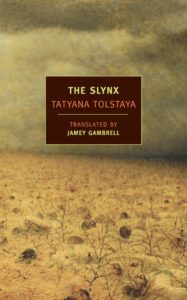
Tatyana Tolstaya, tr. Jamey Gambrell, The Slynx (2000)
It's 2 hundred years after "the Blast," and in Moscow the snow is e'er falling. Benedikt is only glad non to accept any major mutations, and a job, which is to transcribe the "speeches" of the wasteland's leader, which are really plagiarized from former books, not a single one of which Benedikt has always read. Until, that is, he meets the Oldeners, whose hush-hush libraries will change everything for him.
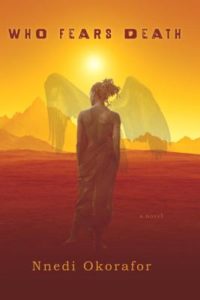
Nnedi Okorafor, Who Fears Decease (2010)
Truly a fantasy novel (if these genre distinctions thing, which they don't), simply set in a mail service-apocalyptic Sudan into which Onyesonwu is built-in, a child of rape and genocide, and hones her magical powers until she can strike dorsum against her father. A striking, thousand novel that anybody should read.
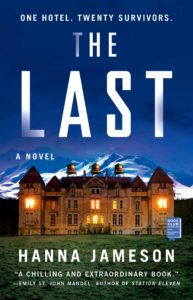
Hanna Jameson, The Last (2019)
We often call up of the apocalypse every bit something that happens to everybody at the same time—but what almost those in remote locales that remain untouched at the get-go? In this novel, the world ends while Jon is at a Swiss hotel, far away from everyone he knows and loves. So what does he do? Become busy solving the more immediate trouble: the dead trunk on the bounds. Of class.
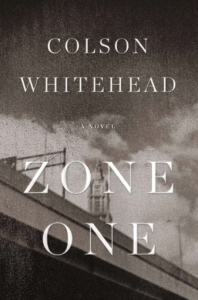
Colson Whitehead, Zone I (2011)
The preeminent modern literary zombie novel, in which everyone left in Manhattan is either a zombie, feral skels or morose stragglers, or a human suffering from PASD (postal service-apocalyptic stress disorder) and our mediocre hero is one of the band sent to clear out the stragglers. A zombie novel for people who don't read zombie novels and a literary novel for people who don't read literary novels.
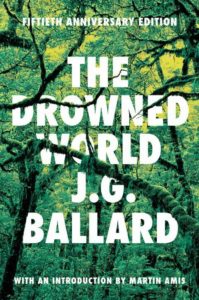
J. Thousand. Ballard, The Drowned World (1962)
My favorite Ballard: a heady quasi-risk novel set in a future in which the entire planet has been transformed into a series of sweltering lagoons, a neo-Triassic landscape that horrifies and also transfixes the survivors, who are plagued by dreams and strange impulses.
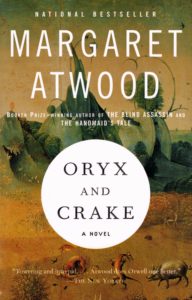
Margaret Atwood, Oryx and Crake (2003)
Yous may debate that The Handmaid's Tale is just as much of an apocalypse novel as Oryx and Crake, and in some ways I'd agree with yous—an apocalypse of mind and morality instead of body and planet. But you know and I both know what we're doing here. Plus, Oryx and Crake, while somewhat less historic, is only equally good, a frighteningly plausible world destroyed by our relentless pursuit for happiness in a canteen. Oh, and trusting corporations. Of course.
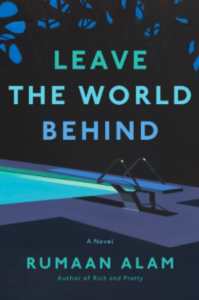
Rumaan Alam, Exit the World Behind (2020)
Alam'due south recent blockbuster striking slash literary darling has what may be the quietest apocalypse on this list, at least from our viewpoint. We encounter virtually nothing, get but hints of the destruction that descends on the world, and instead are focused on the increasing anxiety of two families, thrown together by chance, as they attempt to brand sense of what is happening. Which . . . is probably how nigh of us volition experience the apocalypse, when it comes. Knowing this fact makes the novel all the more chilling.
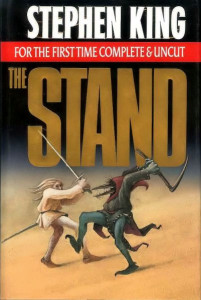
Stephen King, The Stand up (1978)
A classic, and probably Rex's best novel (don't come for me) is a behemoth (famously inspired by The Lord of the Rings) with many threads and characters, all prepare in a world ravaged past a pandemic caused past a weaponized strain of flu that is fatal to 99.4% of those who encounter it. So yous may not want to read it right now!
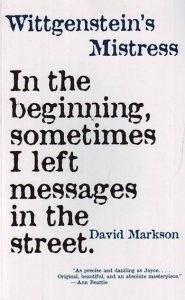
David Markson, Wittgenstein'due south Mistress (1988)
This is not ordinarily discussed every bit a post-apocalyptic novel, and indeed information technology depends on how you lot read it, simply let me nowadays my case: if you take the narrator's discussion for it, she is the last woman alive on earth, typing along to keep herself occupied, with no promise of ever encountering another soul again. And so something must accept happened. The problem is: tin you accept the narrator's give-and-take for it? Either way, the novel takes upwards the same themes as many of the others on this list, albeit in its own experimental, literary style: what is left when cypher is left? How should the survivors live? What did our art, our science, or civilization mean? Did it mean anything at all?
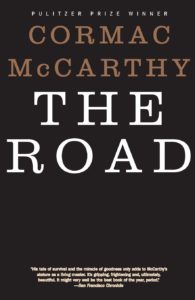
Cormac McCarthy, The Road (2006)
The very kickoff novel yous (probably) think of when someone says "post-apocalyptic," in which a homo and his son travel beyond a blasted-out country that always gets explained. Weirdly punctuated, unforgettable, and something of a divergence for McCarthy—except in its unyielding bleakness.
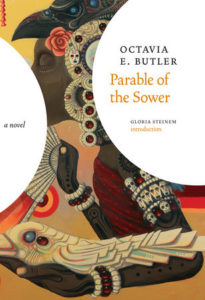
Octavia Butler, Parable of the Sower (1993)
The best and worst thing about this novel is how close it feels to being possible (it is gear up iv years from now). Unchecked climatic change, wealth inequality, and corrupt leadership accept destroyed gild for most people—who at present alive in guarded settlements or scavenge in roving bands—and the hot new drug that makes you into an arsonist is but an extra fun detail. Of class our narrator is affected with the worst possible thing you lot could have in such a scenario, and also the thing that might save everyone: hyperempathy, pregnant she feels the hurting of others. A literary page-turner of the highest order.
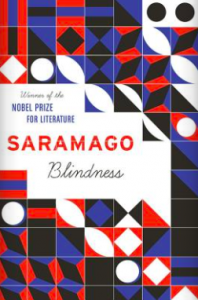
José Saramago, tr. Giovanni Pontiero, Incomprehension (1995; English publication 1997)
Information technology doesn't take a shooting star or a nuclear missile to destroy civilization; all you need is a surprise epidemic of blindness, and men and women volition destroy information technology themselves. Despite the compelling, experimental prose, parts of this feel similar a horror novel, just unlike about of the books on this list, it ends on a note of hope, which makes it a particularly good 1 to read right now.
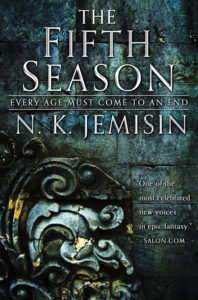
N. 1000. Jemisin, The 5th Flavour (2015)
This is another book non squarely in the post-apocalyptic genre—there are elements of fantasy in here, and science fiction, though as nosotros know all of these borders are porous. What is sure, however, is that the events of the book have place post-apocalypse. Actually, they take place mail multiple apocalypses, each one a devastating turn of conditions that wipes out a salubrious clamper of civilization. The characters in this volume and its sequels are trying to survive post-apocalypse, sure, but they're too trying to foreclose the inevitable adjacent 1.

Mary Shelley, The Last Homo (1826)
Shelley'due south early novel of a 21st century world scrubbed nearly clean past bubonic plague was introduced as if it were merely a collection of prophetic writings that she found and compiled into a novel. Her contemporaries hated information technology. "It'southward as if the critics were trying to demolish with their rhetoric the very possibility of writing a novel on this subject," wrote Morton D. Paley. "The author'southward gender was of course non spared." It was described as "a sickening repetition of horrors," and "the offspring of a diseased imagination, and of a nearly polluted gustation" . . . which should make whatsoever modern reader excited to option information technology up. Good affair time goes on (for now).

Sandra Newman, The Country of Water ice Cream Star (2014)
In post-pandemic Massachusetts, cabals of children run wild—children being the only humans left, as anybody now dies from a disease called "posies" by the age of 20. Unless, that is, our young heroine Water ice Cream, can track down the cure. This is a big, difficult, and ambitious novel told in an invented apocalyptic language—information technology may not be for everyone, but for me it cements Newman'due south status equally an underrated genius.
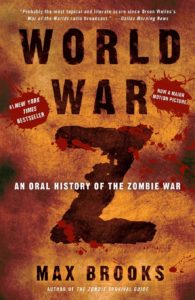
Max Brooks, Globe War Z (2006)
Everyone'south favorite metafictional zombie apocalypse novel past Mel Brooks' son, whose framing device—Brooks every bit agent of the United Nations Postwar Committee and his ain actual/fictional survival guide, interviewing survivors—give it a polyphonic resonance. Don't judge it by the movie, which takes serious liberties, and is not great.
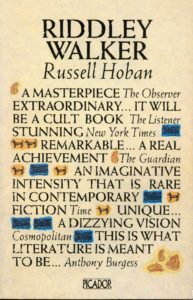
Russell Hoban, Riddley Walker (1980)
This archetype, highly influential for its use of invented dialect, is gear up in England, some two thousand years later the cease of civilization as we know it—when what society is left is uncomfortably reliant on "Punch & Pooty" shows. A layered, Joycean masterpiece that is as much about the ability of story and myth as it is almost the stop of the world and everything after.
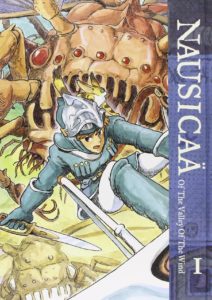
Hayao Miyazaki, Nausicaä of the Valley of the Current of air (1994)
All right, technically this is a manga serial, but I have information technology equally a box set, and I'm counting it. I honey Miyazaki's mail service-apocalyptic world—about of the world is covered in toxic forest, known every bit the Bounding main of Corruption, which is itself overrun past giant, mutant insects, and which is encroaching—and his heroine, a curious princess turned battle captain with a deep respect for the natural world, corrosive as it may be.
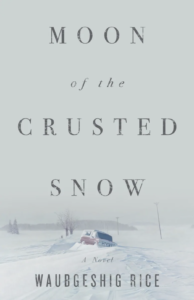
Waubgeshig Rice, Moon of the Crusted Snow (2018)
It's virtually winter, and on the reservation of a pocket-size Anishinaabe community in northern Ontario, the power has gone out. Not just the power either, but the phones and the net, resulting in full isolation. And information technology'south cold. And then the outsiders brainstorm to appear. Fright and anarchy reign, as Evan Whitesky, father of two, looks to the past, to tradition, to try to rebuild his community's hereafter. Chilling in more ways than i.
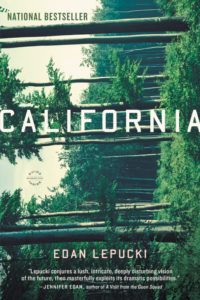
Edan Lepucki, California (2014)
Lepucki's debut is probably most famous for existence the volume Stephen Colbert fabricated famous, but information technology's as well a beguiling novel near love at the end of the world—though we never actually learn what exactly tipped our present into this factionalized and urine-coated future. Could be anything, I guess.
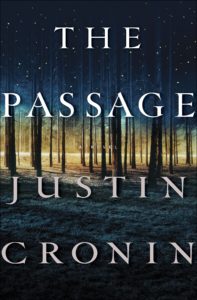
Justin Cronin, The Passage (2010)
One of the best and biggest gimmicky vampire novels is also one of the best and biggest apocalypse novels. It all starts in a lab, in which a virus meant to create super soldiers really creates a plague of monsters—93 years later, the humans left huddle in colonies, hiding from the hunters outside the walls. Just tin can the world really be saved after all?
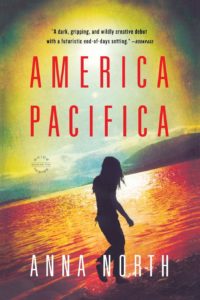
Anna North, America Pacifica (2011)
Some 70 years from at present, North America is frozen. The survivors of the latest Ice Age are clustered on a Pacific island; only the eldest recall life on the mainland. Just when her female parent goes missing, Darcy has to uncover the secrets of the old earth in social club to parse the disruptions of the new.
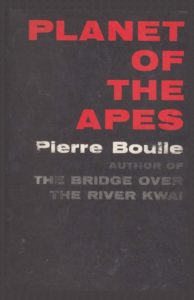
Pierre Boulle, tr. Xan Fielding, Planet of the Apes (1963)
Yous don't notice out that Planet of the Apes is a post-apocalyptic novel, and not only a science fiction novel near another world, until the end of the book. (Distressing for not alert you about this spoiler, but expect, you had nigh 60 years.) What was the cause? Oh, laziness, actually…
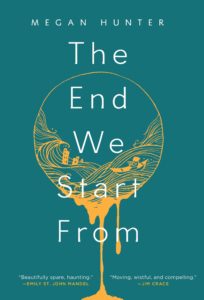
Megan Hunter, The End We Start From (2017)
Parenthood is a kind of apocalypse, yes, merely—well, then is an underwater London. No food, no power, no net; order begins to pause down, simply even this can barely distract a new mother from the magic of her child. Hunter's thin novel asks what to make of the first year of a life (and the first year of motherhood) at the end of the world.
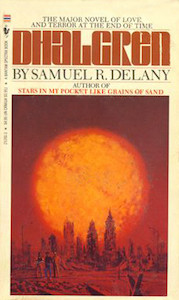
Samuel R. Delany, Dhalgren (1975)
Is it actually a post-apocalypse through which our ane-shoed protagonist drifts? Or are we dealing with a different reality entirely? Either style, information technology has the feeling of a state gone to seed, with bombed-out, disconnected cities, enormous red suns, inexplicable, endless fires. And either way, it is i of the weird greats, a widely influential and difficult—even bulletproof—cult classic.
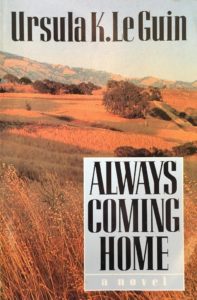
Ursula Thousand. Le Guin, Always Coming Dwelling house (1985)
"The people in this book might exist going to accept lived a long, long time from now in Northern California," is how this volume begins, in glace Le Guin mode. The apocalypse in Always Coming Habitation happened so long that none amongst the Kesh call up it—non even their songs know what caused it. Mostly, what's left is styrofoam. This is not a directly narrative, but a realistic anthropological study of a fictional people, the Kesh, compiled and annotated by a researcher named Pandora. In some ways, it is a minor work in Le Guin's oeuvre, but a fascinating one.
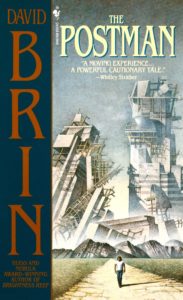
David Brin, The Postman (1985)
The book starts sixteen years after the apocalypse ("It inappreciably mattered anymore what had washed it—a behemothic meteorite, a huge volcano, or a nuclear war. Temperatures and pressures swung out of balance, and smashing winds blew." Much has changed for the survivors, simply ane thing has not: the authority conferred by a uniform. Or and then discovers Gordon Krantz (aka Kevin Costner, if y'all're one of the 8 people who saw the movie accommodation), a wanderer and 1-time drama educatee who dons a uniform and mail sack constitute in an abandoned Postal Service truck and begins to play the function of an officeholder of the "Restored Usa," bringing promise to a populace trying to pull itself back from the brink.
By the way, David Brin had something to say about Donald Trump's contempo attacks on the USPS. "We are in the center right at present of an attempted worldwide oligarchic push to reinstall bullwork, the dismally-failed governance model that dominated 99 percent of societies on vi continents for 6,000 years," he told EW. "The Postman, both the movie and the book, talk well-nigh how essential it is for the states to remember the things that knit us together. Small boondocks America is specially coming to realize that really the post office is the center of town, but volition they realize it in time to make a difference? I don't think Trump cares any more if the Republican party is torched in November. I call back chaos is the goal."
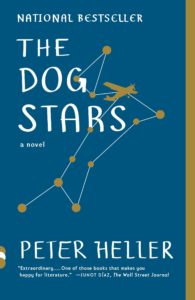
Peter Heller, The Dog Stars (2012)
In this surprisingly uplifting post-apocalypse novel, a contagious disease called "The Blood" has wiped out most of civilisation and left those who remain desperate and territorial (not to mention six feet autonomously from i some other). ""The ones who are left are mostly Not Nice," says Hig, our gentle hero. Hig lives in an old airplane hangar with his domestic dog and grunty friend Bangley, who guards the perimeter, merely later on hearing a strange dispatch on the radio, he eventually goes out in search of other survivors, a final grasp at a meliorate life.
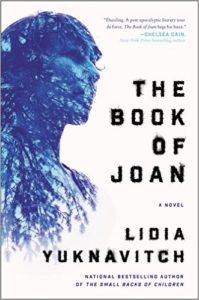
Lidia Yuknavitch, The Book of Joan (2017)
In 2049, the world has been destroyed by global warming and war, and what humans are left orbit their one-fourth dimension dwelling house in a colony called CIEL, led past the tyrannical Jean de Men, cartoon whatever they tin from the rock via "invisible technological umbilical cords." One woman on CIEL, who volition shortly plough 50 and therefore be determined unnecessary and euthanized, tells the story of Joan of Dirt (for this is a riff on the Joan of Arc story), who is trying to save the world.
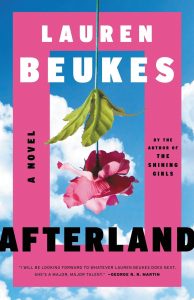
Lauren Beukes, Afterland (2020)
In Beukes' fifth novel, it is 2023, and a pandemic has left fewer that ane% of the world's male population live. I of these is Cole'southward 12-twelvemonth-sometime son, Miles, whom Cole must protect at all costs—considering what nefarious minds, like her sis's, might do with a boy immune to the virus—and and then they go on the lam, Miles going as Mila, hoping to get dwelling house to Johannesburg. Similar all of Beukes' novels, information technology is fun, smart, and slightly sickening.
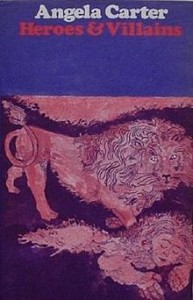
Angela Carter, Heroes and Villains (1969)
Years post-nuclear war, the world has forested over its wounds, animals run gratis, and humanity has split into factions, if not variations: the Professors, the Soldiers, the Barbarians, and the Out People. Marianne is ane of the Professors, and lives in a literal ivory tower with her father—until she sneaks out to feel life as a Barbarian. As you might expect from Carter, this is a terse, mythic, twisted accept on the end of days.

George R. Stewart, Earth Abides (1949)
One of the classics of the genre, in which a pupil, Ish, emerges from a flow of isolation and illness—he was bitten by a diseased rattlesnake—and steps back into the world to detect nigh no one left alive in it. But humans, like any invasive species, volition notice a mode, so Ish meets Em, and they build a community of survivors, new and old—simply instead of rebuilding the earth they knew, they must watch as the younger generation adapts and begins to build a new society based on the earth that is left.
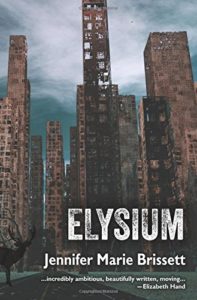
Jennifer Marie Brissett, Elysium (2014)
In this surreal novel, two characters at the end of a world destroyed switch genders, roles, and relationships to one another equally their lives are repeatedly rebooted past a mysterious—and corrupted—atmospheric figurer programme, which is looking (maybe) for a savior.
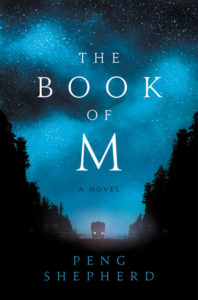
Peng Shepherd, The Volume of M (2018)
This novel includes one of the stranger epidemics in apocalypse fiction: the Forgetting, which has devastated the globe by separating those afflicted from their shadows—and their memories, which causes them to behave erratically, even violently. Equally club breaks downwards, Ory and Max (i shadowless, 1 not) endeavor to find answers, and each other.
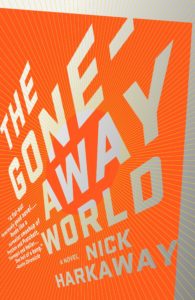
Nick Harkaway, The Gone-Away World (2008)
If you like your post-apocalypses a little ludicrous, you may enjoy Harkaway's take, in which the "Get-Away War" has left three-quarters of the Earth's population dead—or, more specifically, "gone-away," i.e. still in that location, but stripped of information—until information technology comes in contact with a survivor's mind, that is. Our hero is a kung fu trucker named Gonzo, and of form, he must save what's left of the world.
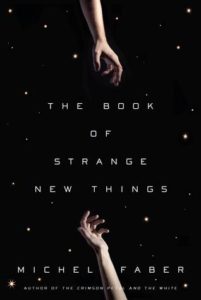
Michel Faber, The Book of Strange New Things (2014)
In this novel, a pastor goes to another planet to spread Christianity, leaving his wife at home; what results, among other things, is that the apocalypse in this novel is telegraphed to the protagonist at a distance, through increasingly alarming and unbelievable missives, even as he finds himself cartoon further away from the life he used to know and the woman he used to love.
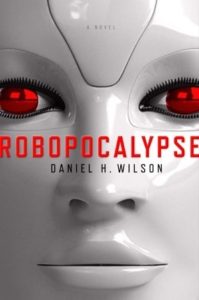
Daniel H. Wilson, Robopocalypse (2011)
For a little relief from nuclear state of war and pandemics, enter the robopocalypse—which, by the mode, is exactly what it sounds similar. Information technology begins, of form, with a brilliant scientist and a sentient calculator program, Archos, which kills its creator and decides that its purpose for existence is to save the planet from the human race. Archos spreads to machines around the earth, which kill or enslave humans—until a few begin to fight back. Another jiff of fresh air: this novel is told from the other side of the apocalypse, a reminder that these things can be reversed, at least sometimes.
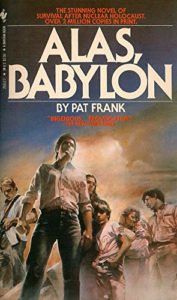
Pat Frank, Alas, Babylon (1959)
In this classic of nuclear holocaust fiction, when much of the United States is destroyed by the Soviet Union, ane minor Florida boondocks survives, adapting to their new lives in a radioactive wasteland.

G. R. Carey, The Girl with All the Gifts (2014)
When this novel begins, it's almost a decade later on the zombie apocalypse has left only a handful of uninfected humans in Britain—the rest are dead or infected, "empty houses where people used to live" known as "hungries." It's been long enough, though, for there to exist a second generation of hungries: children who are preternaturally smart, absurdly potent, and capable (maybe) of human empathy. Unless they odor a human, that is. Then they want to eat it. The human scientists who are left are torn: try to fissure open the eponymous Melanie's encephalon to effigy out how it works? Or treat her like a kid and hope she can lead the globe back to humanity that mode?
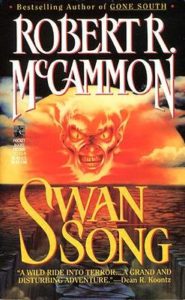
Robert R. McCammon, Swan Song (1987)
A horror novel and an apocalypse novel in one—equally if surviving nuclear holocaust wasn't enough, now there'south a demonic entity known as The Man with the Scarlet Eye, aka Doyle, running effectually. Typical.
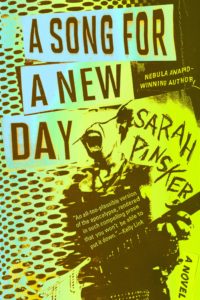
Sarah Pinsker, A Song for a New Mean solar day (2019)
Oh, weird, a novel in which a string of terrorist attacks, mass shootings, bombings, and and so a pandemic, has resulted in widespread fright, consolidation of corporate power, and the terminate of all public gatherings. And then unrealistic, amirite? Instead of Zoom, though, Luce and her band-mates take to contend with StageHolo, basically a holographic pay-per-view for concerts, and their talent lookout Rosemary, who never really knew the world Before. Like all the best apocalyptic fiction, this is actually a book about man connection—the fact that it's also a cool, queer rock and coil novel is simply a bonus.
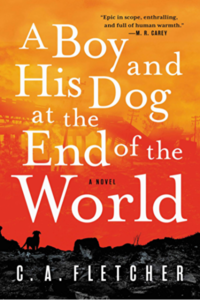
C.A. Fletcher, A Male child and His Dog at the End of the World (2019)
Simply what it says on the tin can. The boy (Griz) and the dog (Jip) are among the survivors later on the "soft apocalypse" known as the Gelding, which neutered most of the world. When Griz'southward other dog (Jess) is stolen, Griz and Jip must make a rescue mission through the ruins of Scotland.
Source: https://lithub.com/the-50-greatest-apocalypse-novels/
Post a Comment for "Post Apocalyptic Reads for an 8 Year Old"